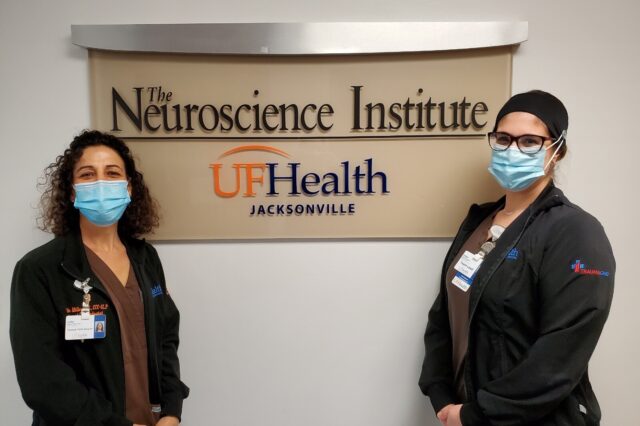Speech-Language Pathology Spotlight: Neurology
We continue celebrating Better Speech and Hearing Month by sharing how speech therapy benefits patients with neurological conditions.

Leslie Miller, CCC-SLP, and Ashlee Walker, CCC-SLP, work in acute care in the Neurology Critical Care Unit and on the Neurology floor.
We continue celebrating Better Speech and Hearing Month by sharing how speech therapy benefits patients with neurological conditions.
How can speech-language pathologists help patients with neurological conditions?
Speech-language pathologists, or SLPs, play a large role in treating patients with neurological conditions. These conditions range from neurodegenerative conditions such as Parkinson’s disease, multiple sclerosis, amyotrophic lateral sclerosis, or ALS, to strokes. Patients with these conditions can have difficulty with their speech, swallowing or cognitive abilities, or more specifically:
- Aphasia, or a loss of ability to understand or express speech.
- Confusion, or impaired memory or reduced awareness of their deficits.
- Dysarthria, or difficulty or unclear articulation of speech.
- Dysphagia, or difficulty swallowing.
These deficits may be progressive in nature, but they can be improved with speech intervention. If the deficits are progressive over time, speech therapy can include compensatory strategies to reduce the burden of cognitive or communication breakdowns. Therapists can also introduce alternative means of communication ranging from picture boards to speech-generating computer devices to allow patients the ability to better express their thoughts. If the patient is anticipated to recover, speech therapy can include targeted tasks to improve speech intelligibility, language use and output, comprehension of speech, cognition and memory.
What does a typical day look like for an SLP who specializes in neurology?
A normal day in Neurology or Neurology ICU can include several types of intervention. Examples of typical patient sessions include:
- A patient with expressive aphasia who has difficulty naming objects and speaking in full sentences. This patient may say one word when they actually mean another — for example, saying “bird” instead of “boy.”
- A patient with dysphagia who has difficulty eating solid foods due to weakness on the right side of their face, leading to a build-up of food in their cheeks and coughing with liquids.
Additionally, a bedside swallow evaluation can be performed to assess a patient’s ability to safely consume food and liquids and rule out aspiration, or food and liquids going into the airway. A speech and language evaluation can also be completed to determine if the patient has difficulty using or understanding language or speaking clearly.
Meet SLPs who support patients with neurological conditions
Leslie Miller, CCC-SLP, and Ashlee Walker, CCC-SLP, work in acute care in the Neurology Critical Care Unit and on the Neurology floor. They also participate in a UF Health Neuroscience Institute multidisciplinary clinic for ALS patients, which is a certified center of excellence by the ALS Association. In this setting, patients are treated by clinicians of several disciplines to help manage their progressive ALS symptoms. SLPs address swallowing by modifying diet textures and providing compensatory strategies to reduce the risk of aspiration. Communication needs are also addressed by utilizing speech-generating computer devices, which can be controlled by the patient’s eyes if necessary.
Leslie has been with UF Health for 21 years. She is passionate about supporting patients who’ve experienced strokes and ALS.
Leslie was introduced to speech pathology because her mother was also a speech-language pathologist. She found her passion for working with adults and swallowing disorders during her graduate school internships.
Ashlee has been with UF Health for 6 1/2 years. She is passionate about working with patients who’ve experienced strokes, ALS and Myasthenia Gravis.
Ashlee learned about what speech-language pathologists do after her grandmother suffered several strokes which impacted her ability to swallow and communicate. Ashlee would complete her grandmother’s “speech homework” with her to improve her communication, which later led her to the field of speech pathology.
Visit UFHealthJax.org/rehabilitation-services to learn more about speech therapy and other services offered at UF Health.
About the author
